Impermanence
Guest blogger, intern Adeline Skovronek
From the quiet back room archives to the bustling floor of the Public Library there are stacks of books and papers, recording people real, imagined, and those floating somewhere in between. Everyone wants to be remembered, to have his name carved somewhere into eternity. You always think it’s just a lucky few – presidents, actors, authors. Their stories might seem forever, but what is really captured in such a public recounting of their lives? Digging through boxes retrieved from forgotten corners, I get to see the documents of people whose lives have otherwise been handed over to time, dumped in crates and marked as ordinary, average citizens. With the passing of the next century, their names will be erased, a new roster of appellations penciled in over clumsy eraser marks.
My interest in books and old papers of any origin was well established in grammar school, and by now soars high above the clouds. My first serious venture into the world of Libraries and Archives began in high school, where I volunteered in my school library. I worked almost every day shelving books, manning the circulation desk, or doing inventory. I debated with the biographies, danced with the poetry, and dreamed with the fiction. Then one day I left the main floor of the Library and moved into a small, dimly lit back room full of flat files and ceiling high shelves. There I first discovered the stacks of unopened yearbooks, the crumbling files of meeting minutes, and the undeveloped plans of a 100-year-old institution. It was a whole other world, lacking famous names like Fitzgerald, Marilyn, Kennedy. Instead the space was filled with personal details of individuals and struggling organizations. I was no longer an onlooker, holding the four-thousandth copy of a popular publication. I suddenly had in my hands the only existing version of a map from the 1700’s, a poem written on receipt paper, or the student papers of an Austrian girl stamped with the seal of the Third Reich.
~
What caught my attention while flipping through a box of rediscovered student records was the bright red seal, complete with raised lettering and toothed edges. The classic image of the eagle, wheat in one talon and arrows in the other, sat encircled by the words American Consulate General Vienna, Germany. My eyes moved instinctively to the two purple and blue seals farther up the page, and I immediately recognized the Nazi eagle gripping its swastika. I spent nearly an hour looking through this young woman’s file, entranced with the paper trial of her life. Granted, the file prompted more questions than answers about her departure from Nazi occupied Austria and subsequent medical career, but I was able to learn a great deal through the administrative and legal documents in the archive’s collection.
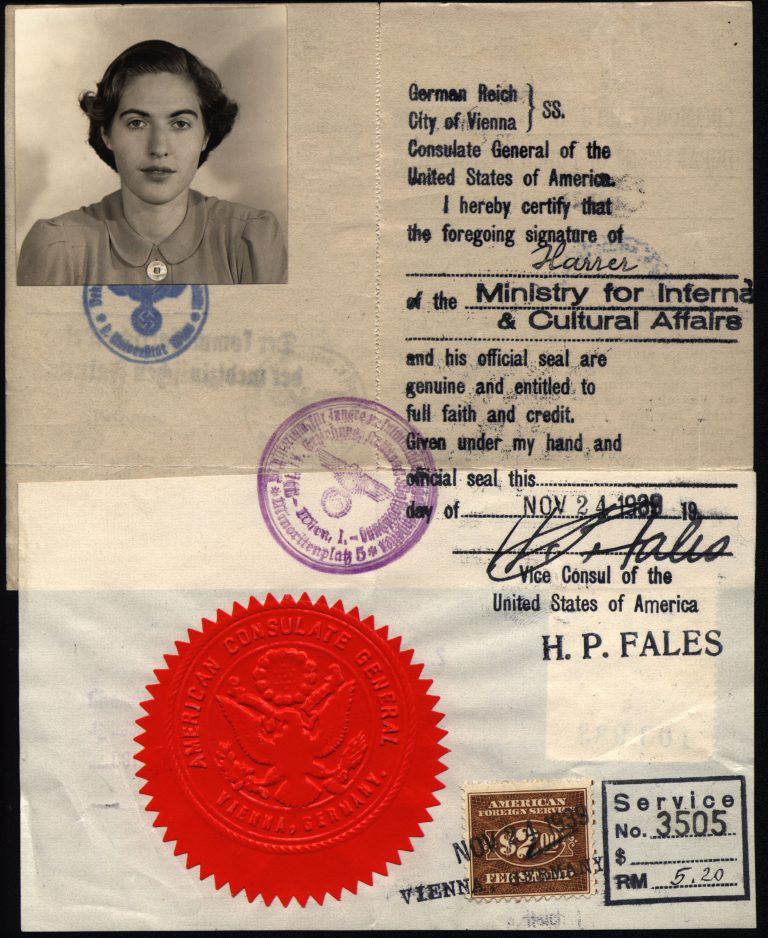 One of Dorothee’s documents with the US consulate seal reading ‘Vienna, Germany’
One of Dorothee’s documents with the US consulate seal reading ‘Vienna, Germany’
Dorothee Gold was born in 1916 in Stuttgart Germany to an American mother and German father. From 1934 until 1938 she attended the University of Vienna, where she took classes in preparation of a medical career. From her original school transcripts and their English translations, we can see her class lists, final grades, and even the speakers whose lectures she frequented. Lending more detailed information is also a small booklet, in which all of Dorothee’s classes were recorded.
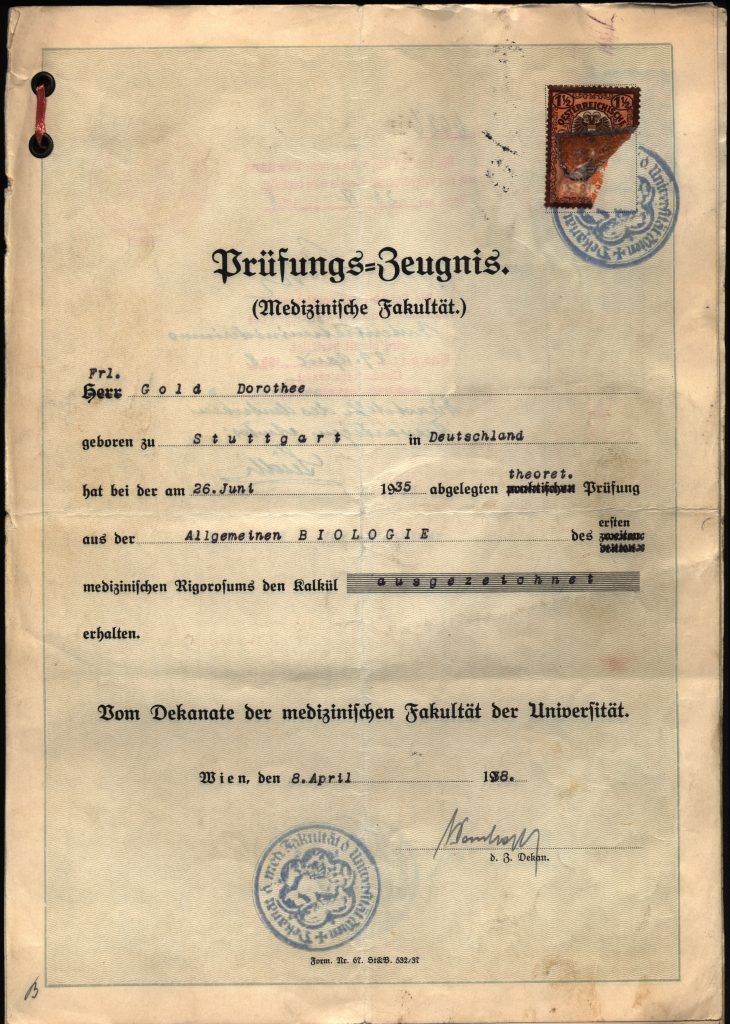
Examination Certificate for General Biology from the University of Vienna – written in German
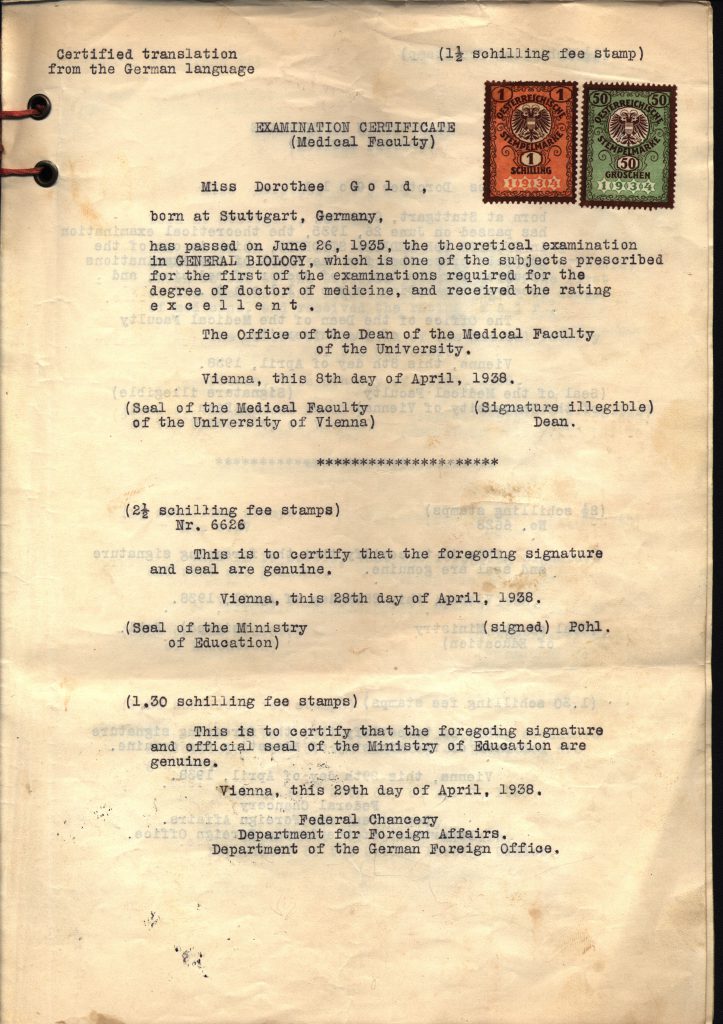
Examination Certificate for General Biology from the University of Vienna – translated into English
As Austria transitioned from unofficial to official Nazi governance, Dorothee applied to the Woman’s Medical College of Pennsylvania. Because of the overlapping time period - the day that officially marks the beginning of Nazi occupation in Vienna is March 12th, 1938 – her papers received official stamps before Germany took control, immediately after, and almost a year later. The result is that a wide range of stamps and seals can be found within her files, adding a dimension of intrigue and historical importance.
With her arrival in the United States, Dorothee Americanized her name – revising the spelling to Dorothea. Taking into consideration her eight semesters of medical school in Austria, WMCP admitted her into its second year class, and three years later she graduated in the summer of 1941 with the degree of Doctor of Medicine, under the name Doris Phillips.
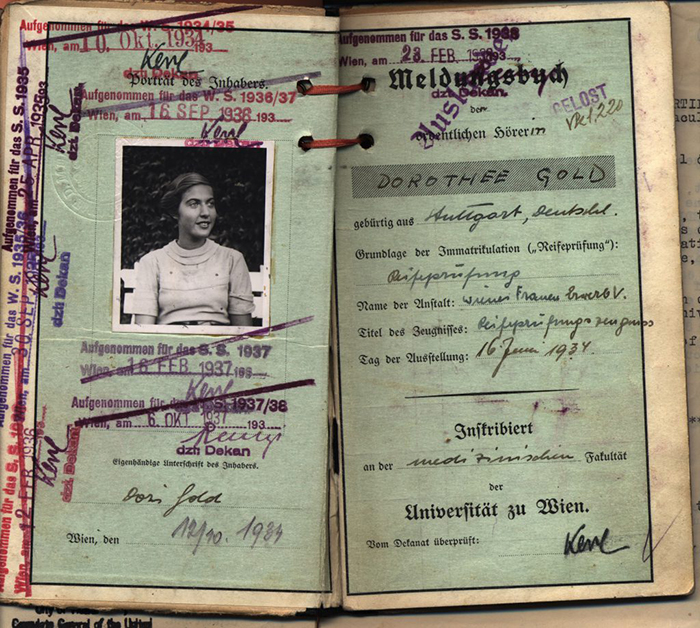
Dorothee's notebook from the University of Vienna. It includes lists of her classes and lectures, as well as records of the individual teachers and speakers.
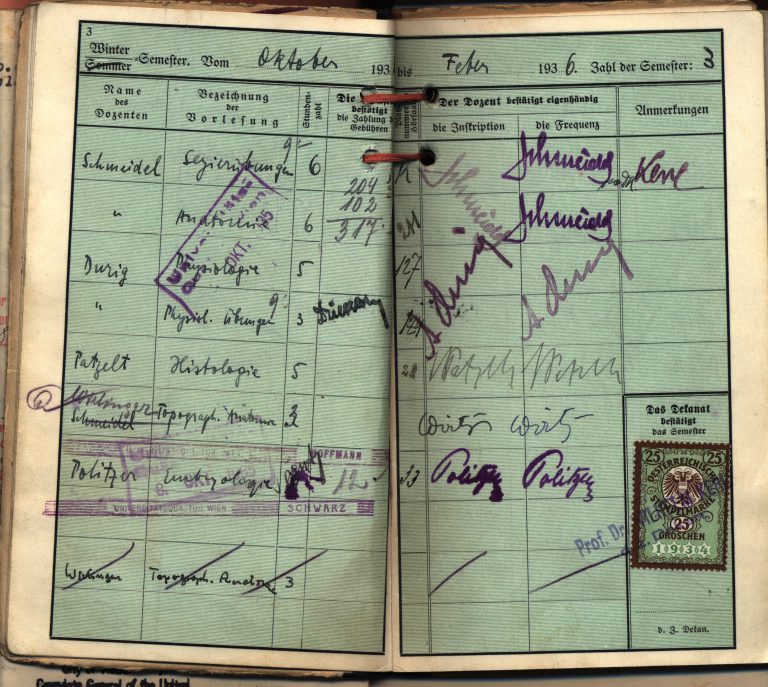
Across the top of each page is listed details, including the months, year, and which semester of schooling she is currently attending.
The Woman’s Medical College of Pennsylvania frequently sent out alumnae surveys, asking its former students to supply the institution with information on their career and family – if applicable. In Doris’s file are two such documents, from which most of the information regarding her professional career was gathered. According to these papers, Doris completed her residency in child psychiatry at the Cleveland City Hospital in Ohio. After her residency she held various positions, all related to the field of child psychiatry, in several hospitals and schools across the country.
Dorothea's parents changed their last name from Gold to Phillips, and she did likewise - also changing her first name. This is the notice that was published in the local newspaper as part of the legal process of a name change.
In 1952 she married Dr. David Riddell Wheeler and changed her name one final time to Doris Phillips Wheeler. Practicing under her maiden name, she opened her own practice in Chicago, initially on a part-time basis. Over the next three years she gave birth to two children, while maintaining her practice and taking no considerable time off from work. For Doris the year of 1958 brought much change, seeing both the death of her husband and her graduation from the Institute of Psychoanalysis, Chicago. Over the following decade she raised her two children, while consulting for various institutions, including the Michael Reese hospital, Evanston Family Agency, the Jewish Children’s Bureau, the Jewish Family and Community Service, Chicago State Hospital, and the Illinois Department of Mental Health.
Doris died on October 28th, 1968, leaving behind her two adolescent children.
~
Working in an archive, I am frequently left to marvel at the amount of information individuals and institutions leave behind. I often find myself wondering what purpose they serve in the larger machinations of the universe. Sometimes I feel like such detailed records of what usually appear irrelevant materials simply bog us down, but other times I am inspired by the personal glimpses into past events that such chronicles preserve.
For now, I remember such details, as they are, of the life of Doris Phillips Wheeler. Eventually, I will forget. And who’s to say how long it will be until another party opens that box, that file, and takes the time to scrutinize each document. And how many other boxes are there, stuffed and bursting round the edges, containing the minutes of somebody’s life? I like to think that I held in my hands a unique story, unparalleled in its existence. But really, how many countless young women have fled their countries, surrounded by tensions of war, to look elsewhere for brighter horizons? It is the stuff of history.